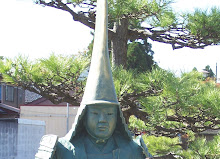 It's not a stereotype to say that group Japanese behavior has a tremendous influence the people of Japan. The roots of this reality are in Japanese traditional culture and the notion of the "the house."
It's not a stereotype to say that group Japanese behavior has a tremendous influence the people of Japan. The roots of this reality are in Japanese traditional culture and the notion of the "the house."In the Japanese language, ie translates as "house," but broadly speaking it refers to the clan or institution that binds you to japanese society: the family, school or company, for example. Since the end of the second world war and end of Japanese traditional culture, the company has become the clan that most Japanese identify with.
Ask a young man or women in Tokyo, "What do you do?" and many are apt to say: "I work for Honda," instead of saying they're a secretary or the director of marketing.
One reason for this is that modern Japan and Japanese behavior grew from the feudal history of the Japanese where your station in life was determined by your family, caste or clan. There are even stories of Japanese history where entire families were killed because of the crimes of a single member of that family. At the very least, it's safe to say that throughout the history of Japan, shameful acts by one member of a family have often led to entire families being marked with dishonor.
And it is this very notion of shame and dishonor that still permeates Japanese . There is still a common Japanese proverb that states: "The nail that sticks up gets knocked down." In many situations, Japanese people tend to keep their individual ideas and inclinations private, preferring to understand the group "consensus" and then to safely go with that.
This process is so internalized that many Japanese do it without even thinking about it.
Many westerns, of course, hold the individual and his desires to be supreme. For the Japanese, however, this disturbs the harmony of society; and if we can speak of "group virtues," than harmony is certainly one in Japanese culture and it explains much about japanese behavior and the history of the japanese.








No comments:
Post a Comment